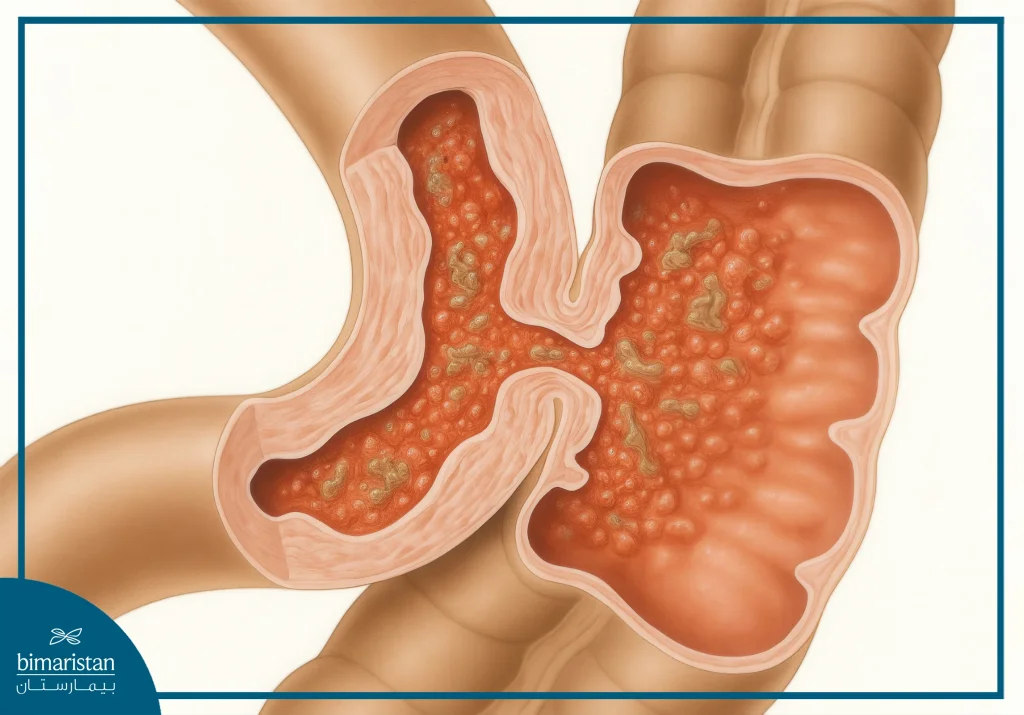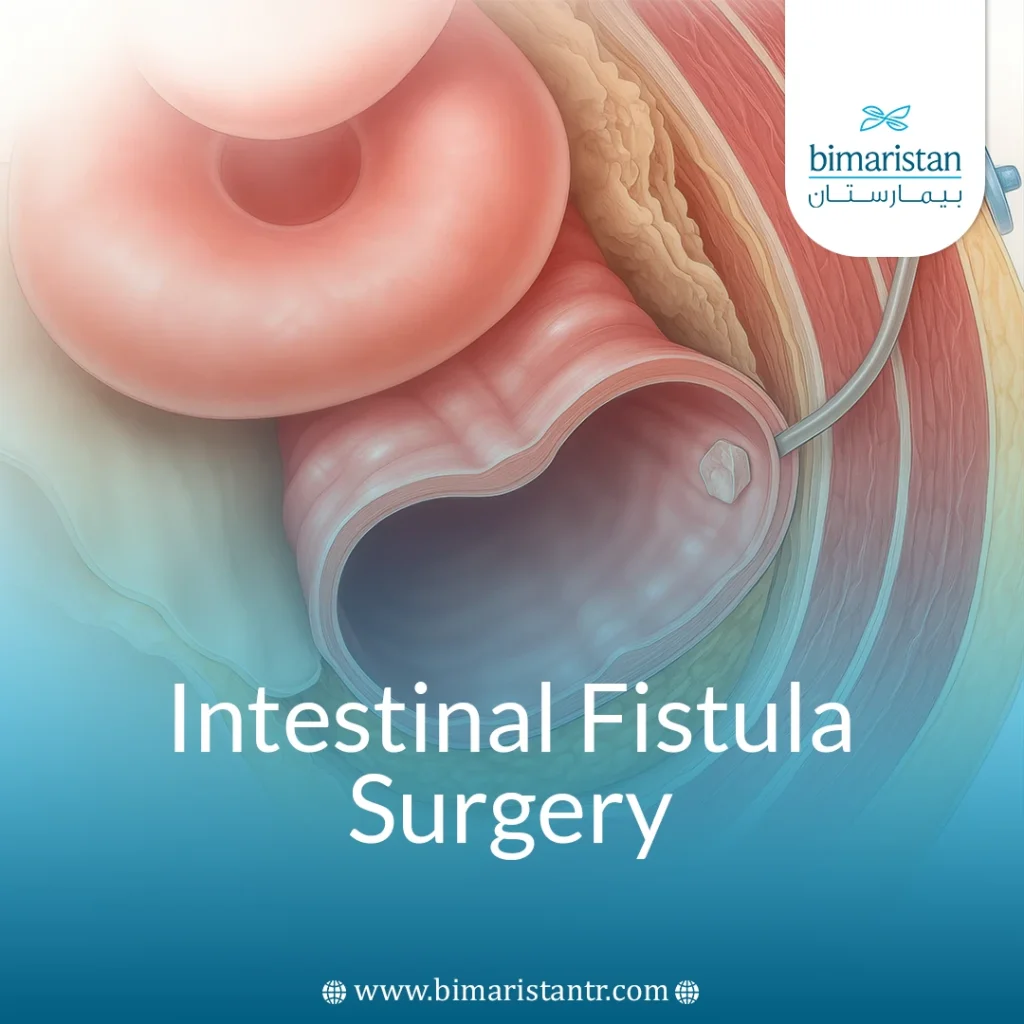Intestinal fistula surgery is a necessary treatment step in some cases of abnormal connections between the intestines and other organs or the skin. Doctors resort to it when medical treatment fails or serious complications arise. Its success depends on accurate diagnosis and proper timing, taking into account the patient’s general condition.
What is an intestinal fistula?
Intestinal fistula: An abnormal channel that develops between the intestinal lumen and another surface lined with cells, such as the skin or another internal organ, leading to leakage of intestinal contents into that organ. Intestinal fistulas are divided into two main types: External fistulas, which attach to the skin, such as the Enterocutaneous fistula, and internal fistulas, which attach to an internal organ such as the bladder (Enterovesical), vagina (Enterovaginal) or even blood vessels as in the Aortoenteric fistula. The most common areas for fistulas are generally the small intestine, colon and finally anal fistula and are often associated with previous surgery, chronic infections or intestinal diseases such as Crohn’s disease.

Causes of intestinal fistula formation
- Chronic inflammatory diseases: Crohn’s disease and ulcerative colitis, where deep inflammation and ulcers lead to the formation of fistulas between the intestines and neighboring organs or the skin.
- Complications after abdominal surgery: Anastomotic leaks, inadvertent wounds to the bowel during surgery, direct exposure to surgical mesh, or large parietal defects are the causes in about 80-90% of cases.
- Severe infections or intestinal abscesses: Diverticulitis, appendicitis, intra-abdominal abscesses, or chronic infections (such as amoebiasis, tuberculosis, or salmonella) can lead to fistula formation.
- Tumors or traumatic injuries such as colon or small bowel cancer, which erode the walls and create a fistulous channel, or abdominal trauma (such as stabbing or accidents) may cause intestinal fistulas.
- Long-term use of drainage devices: Certain surgical instruments or catheters may cause fistulas if they persistently irritate or ulcerate the tissue, such as drainage tubes or surgical mesh, which can erode the intestinal wall over time.
Symptoms of intestinal fistula
Some intestinal fistulas may not show obvious symptoms at first, making early diagnosis essential to avoid complications. This is a collection of symptoms caused by an intestinal fistula:
Abnormal discharge from the wound or skin
- Persistent drainage of fluid or pus from the skin, especially near the abdomen
- Foul-smelling discharge from an opening in the skin
- Intestinal contents leaking out through a skin opening
Chronic diarrhea or leaky stools
- Disruptions in the movement of food through the intestines
- Persistent diarrhea caused by leaky gut contents
- Decreased absorption of fluids and nutrients
Malnutrition and weight loss
- loss of appetite
- Unintentional weight loss
- Generalized weakness due to malabsorption
- Dehydration due to loss of fluids and salts
Persistent abdominal pain
- Abdominal pain of varying degrees
- Sensitivity when touching the abdominal area
- Persistent abdominal cramping or discomfort
Symptoms of infection or fever
- Temperature rise
- chills and vomiting
- Rapid heart rate (palpitations)
- Low blood pressure
- Signs of sepsis include organ failure in severe cases.
When is intestinal fistula surgery necessary?
- Failure of conservative treatment: When the fistula does not respond to nutritional therapy (such as parenteral nutrition) or drug and antibiotic therapy within an appropriate period of time, intestinal fistula surgery becomes the necessary treatment option.
- Persistent bleeding or sepsis: Continued leakage of intestinal contents to the outside or to internal organs or uncontrolled sepsis is considered high risk and requires surgical intervention to prevent the condition from worsening.
- Severe weight loss: If the fistula leads to malabsorption and significant weight loss despite dietary support, intestinal fistula surgery is necessary to restore normal gastrointestinal function and improve nutritional status.
- Intestinal obstruction or tissue damage: If the fistula results in bowel obstruction or shows signs of damage to the surrounding tissue, such as fibrosis or necrosis, surgical intervention is crucial.
- Abscess or damage to neighboring organs: In cases where the fistula is associated with an intra-abdominal abscess or erosion of neighboring organs such as the bladder or skin, the goal of surgery is to drain the abscess, repair the tissue, and restore safe digestive continuity.
How is intestinal fistula surgery performed?
Intestinal fistula surgery is a meticulous process that begins with a thorough evaluation and concludes with the repair of the abnormality and restoration of gastrointestinal function.
Preoperative assessment
Before the procedure, the patient undergoes a thorough evaluation that includes:
- Radiographs (such as CT scans) to determine the course of the fistula and the location of adhesions or abscesses.
- An endoscopy is performed to evaluate the affected parts of the intestine and make sure there are no tumors or blockages.
- Blood albumin analysis is a crucial indicator of preoperative nutritional status.
Surgery options
The surgery plan varies depending on the severity and complexity of the fistula and includes:
- Fistula resection complete with damaged tissue
- Intestinal reconstruction using a direct connection between healthy segments or separation of connected organs such as the bladder or vagina when there is a transit fistula
- The use of temporary shunts: Such as colostomy or ileostomy, in complex cases to facilitate healing and minimize pressure on the affected area
Surgical techniques
Intestinal fistula surgery is performed in two ways:
- Open surgery, especially when there are severe adhesions or abscesses
- Laparoscopic surgery in simpler cases to minimize surgical damage and speed recovery
This procedure is an essential step in the treatment of intestinal fistulas that are unresponsive to conservative treatment and is carefully planned to achieve healing and minimize complications.
After intestinal fistula surgery
- Recovery time: Ranges from several weeks to months, depending on the case and the complexity of the surgery.
- Nutritional care and intravenous support: You may need temporary parenteral nutrition until bowel function improves.
- Return to normal activity: It is possible to gradually return after recovery while avoiding excessive exertion at first.
- The possibility of fistula recurrence: Especially in chronic diseases such as Crohn’s disease and requires regular medical follow-up.
Possible complications of intestinal fistula surgery
- Wound Infection: Caused by contamination during surgery or manipulation of infected tissue, it can lead to sepsis or an intra-abdominal abscess.
- Anastomotic Leak/Abscess: The result of an intestinal anastomosis disintegrating and causing intestinal content to leak into the abdominal cavity and form an abscess.
- Poor Wound Healing: Due to malnutrition, steroid use, or weakened immunity, resulting in delayed healing or opening of the wound after surgery.
- Fistula Recurrence: May recur in 18-33% of cases.
- Systemic infection/sepsis: May arise from an intestinal leak or manipulation of infected tissue and lead to systemic symptoms and may be life-threatening.
- Excessive Blood Loss: During the removal of severe adhesions, especially in anemic and malnourished patients.
- Inadvertent Enterotomies (Inadvertent Enterotomies): These occur during the removal of dense adhesions and need immediate repair to avoid complications.
- Short Bowel Syndrome: The result of the removal of large portions of the small intestine, leading to chronic malabsorption and serious nutritional complications.
- Mortality: The mortality rate can be as high as 40% in severe cases with sepsis, malnutrition, or significant delay in surgical intervention.
In conclusion, intestinal fistula surgery can be life-saving and significantly improve the patient’s quality of life. Early diagnosis and careful follow-up are necessary to minimize the risk of complications, and consulting a specialized surgeon is an essential step to determine the best treatment plan that suits the patient’s condition to ensure the success of intestinal fistula surgery.
Sources:
- Medscape. (n.d.). Intestinal fistula surgery treatment & management. Medscape. Retrieved June 27, 2025.
- Bal, N. (2023, September 15). Intestinal Fistula Surgery: Practical Essentials, Pathophysiology, Etiology. Medscape.

